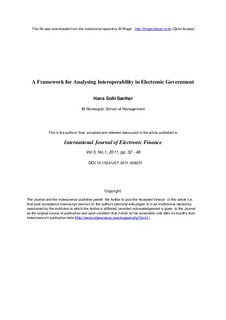| dc.contributor.author | Solli-Sæther, Hans | |
| dc.date.accessioned | 2012-07-04T09:20:53Z | |
| dc.date.available | 2012-07-04T09:20:53Z | |
| dc.date.issued | 2011 | |
| dc.identifier.issn | 1746-0077 (online) | |
| dc.identifier.issn | 1746-0069 (print) | |
| dc.identifier.uri | http://hdl.handle.net/11250/93556 | |
| dc.description | This is the author's final and acceptet version of the article, post refereeing. Publisher's version is available at http://www.inderscience.com | no_NO |
| dc.description.abstract | E-government interoperability has been recognised to have a
potentially great impact on productivity and user satisfaction. Based on the
stage hypothesis model of growth in e-government interoperability,
a framework to analyse and predict interoperability is suggested. Lessons
learned from the experiences of the government sector in Norway are useful in
analysing the number of stages, dominant problems at each stage, evolutionary
path, and the economies of interoperability. Using the organisational, semantic
and technical parameters of the framework, benchmarks applicable to each
stage are applied to the case studies. Findings indicate that governments face
different issues, expectations and benefits, depending on their maturity level. | no_NO |
| dc.language.iso | eng | no_NO |
| dc.publisher | Inderscience Publishers | no_NO |
| dc.subject | e-government | no_NO |
| dc.subject | stages-of-growth | no_NO |
| dc.subject | interoperability | no_NO |
| dc.subject | model | no_NO |
| dc.subject | benchmark variables | no_NO |
| dc.subject | benefits | no_NO |
| dc.subject | e-finance | no_NO |
| dc.title | A Framework for Analysing Interoperability in Electronic Government | no_NO |
| dc.type | Journal article | no_NO |
| dc.type | Peer reviewed | no_NO |
| dc.source.pagenumber | 32-48 | no_NO |
| dc.source.volume | 5 | no_NO |
| dc.source.journal | International Journal of Electronic Finance | no_NO |
| dc.source.issue | 1 | no_NO |
| dc.identifier.doi | http://dx.doi.org/10.1504/IJEF.2011.038221 | |
